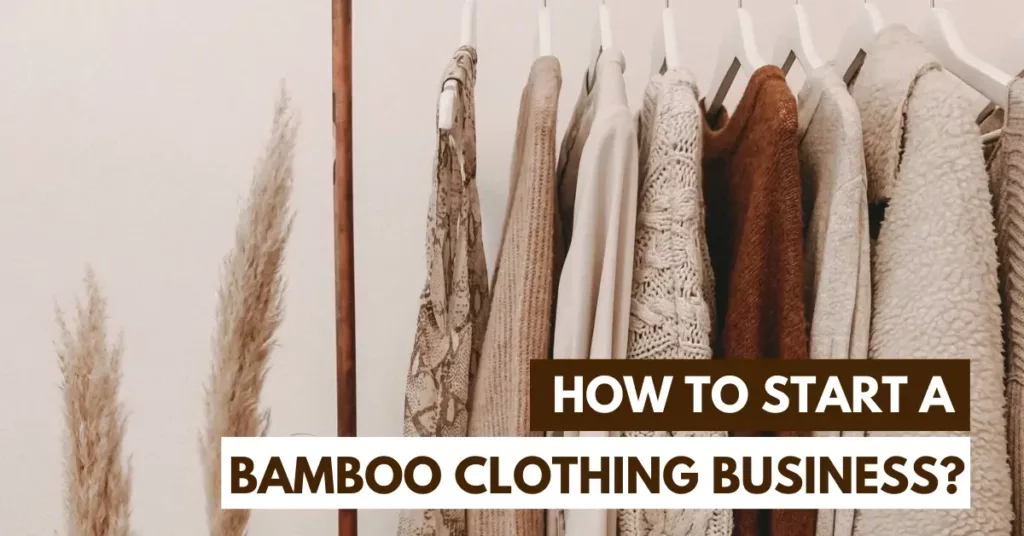Bamboo clothing has become a leader in the environmentally conscious fashion revolution in a world with increasing environmental awareness. How to start a bamboo clothing business? Launching a bamboo clothing company requires more than just creating and marketing apparel.
It also requires a grasp of the complex web of sustainable fashion, from finding the correct bamboo fabric to developing an eco-aware brand identity. We’ll be your tour guide on this adventure. From the bamboo woods where it all starts to the online shops where your creations will live, we’ll guide you through each stage.
The Implication of Bamboo Clothing
Bamboo apparel has been trendy recently, and for good reason. Bamboo clothing is becoming more popular as a sustainable substitute for conventional materials as people grow more environmentally concerned. Bamboo plants grow remarkably quickly and need much less water than cotton plants.
Bamboo fabric is perfect for activewear and daily apparel since it has inherent moisture-wicking and breathability qualities. As a company owner, wearing bamboo clothes lets you capitalize on the expanding market for eco-friendly apparel. It’s a movement towards a greener, more responsible future, not just a trend.
Tips and Tricks to Launch a Bamboo Clothing Business
How to start a bamboo baby clothing business successfully? It requires in-depth market analysis, concentration, and hard work. Let us discover below.
1. Market Analysis: Finding Your Specialty in Bamboo Clothing
The foundation of a prosperous bamboo clothing business is market research. It’s essential to comprehend your target market’s preferences and how your brand fits within those groups. You may determine your unique selling proposition (USP) within the bamboo clothing business through in-depth market research.
Analyze consumer trends and tastes in a sustainable fashion to start. Look into the products and services offered by your rivals. Find market niches where your brand of bamboo apparel may shine. Pay close attention to client comments, both online and off.
What are people saying about clothes made of bamboo? What do they adore, and what do they wish were better? By acquiring this essential data, you can customize your brand and products to satisfy your target market’s requirements and preferences.
2. Seek Where to Buy Bamboo Fabric
Producing high-quality bamboo garments requires finding the proper bamboo fabric. Sustainable sourcing is essential to ensure that your brand appeals to eco-aware customers. Consider elements like the type of bamboo (such as bamboo viscose or lyocell) and the certifications of your suppliers when obtaining bamboo fabric.
Strong supplier connections are essential for reliable, high-quality sourcing. To ensure your bamboo fabric satisfies your criteria, communicate your sustainability objectives and collaborate with others.
3. Create a Bamboo Clothing Line, from Idea to Execution
From idea to manufacturing, there are various crucial processes in the design of bamboo apparel. Start by outlining your notions in comprehensive design concepts. Bring your ideas to reality by collaborating with fashion designers with bamboo cloth expertise.
A crucial step is prototyping, enabling you to test designs and ensure they adhere to your quality requirements. Keep fit, comfort, and durability in mind. Sustainable clothing is more than being environmentally friendly; it’s also about making something people want to wear. Consider inclusive sizing and various designs to appeal to a broader audience.
4. Bamboo Store Opening | Online vs. Brick-and-Mortar Stores
When starting your bamboo clothing company, you have two main alternatives: an internet store or a brick-and-mortar retail location. Each offers advantages and things to keep in mind.
By opening an online business, you may have more freedom and reach more customers. However, a robust online presence, user-friendly website, and successful e-commerce strategy are necessary. A physical store provides a more real purchasing experience but has more intense local rivalry and significant initial expenditures.
To increase the exposure of your business, consider taking a hybrid approach that combines an online presence with sporadic pop-up stores or partnerships with eco-friendly boutiques.
5. The Making of Bamboo Clothing
Comprehending the bamboo clothing manufacturing process to guarantee quality and sustainability is essential. Beginning with the extraction of bamboo fiber, mature bamboo stalks are gathered and turned into pulp. This pulp is converted into the lyocell or bamboo viscose fibers used to make the cloth. The bamboo fabric will next be spun, weaved, and colored.
Sustainable production techniques hold the key to success. Look for manufacturers and suppliers who use closed-loop technologies to save water and chemical consumption. Consider utilizing non-toxic, low-impact colors that complement your eco-friendly brand as well.
7. Eco-friendly Printing and Dyeing Methods for Textiles Made of Bamboo
You may add distinctive patterns and colors to your apparel while retaining sustainability by printing and dying bamboo materials. Using eco-friendly printing and dyeing processes is crucial to represent your company’s ideals.
Investigate techniques like water-based and natural dye printing, which have less impact on the environment than conventional printing techniques—partnering with printers and dyers who value sustainability and employ non-toxic, biodegradable ink and dye alternatives. Environmentally minded customers would appreciate this dedication to sustainable practices.
8. Building a Bamboo Clothing Brand | Packaging, Branding, and Logo Development
There is much more involved in developing a successful bamboo apparel company than just the items themselves. Your brand’s identity, logo, and packaging are crucial in getting your point across to customers. Your branding tactics should be built on sustainability.
Create a logo that captures your green philosophy and employs eco-friendly packaging materials. Your branding should demonstrate ethical manufacturing and customer empowerment.
9. Funding Options and Advice for Starting a Bamboo Clothing Business
Although challenging, financing your bamboo clothing firm may be lucrative. Investigate several sources of finance, such as loans, crowdsourcing, or bootstrapping. Loans can include debt but can give upfront funds. Bootstrapping entails spending your own money and reinvesting revenues to expand your company.
Effective financial management is critical regardless of the financing route. To aid in decision-making, write a thorough company strategy and financial estimates. If necessary, seek financial professionals’ counsel and consider grants or contests that support your sustainable fashion objectives.
10. Trademarks, Permits, and Regulations Are Important Legal Considerations
Legal issues for starting a bamboo clothing business include trademarks, licenses, and adherence to industry rules. You can safeguard your brand identification by filing trademark applications for your name and logo. Investigate the business licenses and sales tax permits needed locally, state, and federal.
11. Eco-friendly Options for Shipping Your Bamboo Clothes with Sustainable Packaging
Your bamboo clothes shipping packing should reflect your dedication to sustainability. By choosing packaging materials that support the principles of your business, you can demonstrate your concern for the environment. Consider alternatives like reusable packaging, biodegradable mailers, and cardboard boxes. Reduce the usage of plastic and adopt environmentally friendly sealing methods.
12. Inventory Management
Effective inventory management is essential for your bamboo clothing business to minimize waste and increase profitability. Put methods in place to manage stock levels and order numbers. To eliminate extra stock, consider just-in-time inventory systems.
To avoid overstocking, often evaluate your inventory turnover rate and identify slow-moving goods. Invest in inventory management software to simplify operations and get timely stock-level information.
Sustainable Bamboo Apparel Certifications
Accreditations are intended to guarantee the ethical and sustainable manufacture of bamboo clothes. The following are some essential certifications for eco-friendly bamboo clothing.
1. Standard 100 by OEKO-TEX
This certification, which is well-known in the textile business, guarantees that clothing made from bamboo (as well as other textile goods) is free of contaminants that are detrimental to human health. It emphasizes the safety of the finished product and the lack of dangerous ingredients.
2. Global Organic Textile Standard (GOTS)
Although GOTS does not specifically certify bamboo, it does certify textiles manufactured from organic materials. It establishes stringent standards for fair labor practices, environmental effects, and organic agricultural methods across the supply chain. The use of environmentally safe and sustainable manufacturing techniques is guaranteed by GOTS certification.
3. Forest Stewardship Council (FSC)
Most of the bamboo goods that use bamboo as a source of wood are covered by this certification. If the wood used to make your bamboo apparel comes from bamboo, FSC certification guarantees that the bamboo was harvested sustainably and did not contribute to deforestation.
4. Certification for Fair Trade
Although it is not particular to bamboo, Fair Trade accreditation guarantees that the employees who produce your bamboo clothing are appropriately treated and paid a living wage. The emphasis of this certification is on moral workplace behavior.
5. Organic Content Standard (OCS)
If you use organic bamboo cloth, this certification applies to you. OCS confirms the amount of organic material used in a finished product, giving consumers information on the organic material used in their apparel.
6. Cradle to Cradle (C2C)
This certification assesses a product’s sustainability regarding material health, material reutilization, renewable energy, water stewardship, and social fairness. Although it is not particular to bamboo, it may be used to evaluate the sustainability of bamboo garments in general.
Though gaining these certifications could include completing particular requirements, frequent audits, and costs, they can significantly increase the legitimacy of your sustainable bamboo clothing line in the eyes of shoppers who care about the environment.
What are the Prospects for the Bamboo Clothing Market in the Future?
The bamboo apparel market has a bright future, as evidenced by some trends and variables that point to continued demand and growth for bamboo-based textiles. Here are some essential details about the bamboo apparel industry’s prospects for the future.
1. Concerns About Sustainable Solutions
There is an increasing need for environmentally friendly and sustainable clothing solutions as public awareness of environmental concerns continues to develop. Because of bamboo’s quick growth, low water needs, and minimum need for pesticides or fertilizers, bamboo clothing is regarded as being environmentally friendly.
Bamboo apparel is becoming increasingly popular with consumers as a substitute for conventional, resource-intensive materials like cotton.
2. New Developments in Textile Technology
The quality and adaptability of bamboo fabrics have improved due to ongoing developments in textile technology. Textiles with improved performance qualities, including moisture-wicking, breathability, and durability, may now be made thanks to innovations like combining bamboo with other materials (such as organic cotton or recycled fibers).
The popularity of bamboo clothing in numerous applications is anticipated to increase due to these advances.
3. Reputation in the Fashion Industry
Major fashion houses and designers increasingly use bamboo and other eco-friendly materials in their designs. Consumers more widely accept bamboo clothing due to its widespread acceptance and endorsement. Collaboration between well-known fashion brands and manufacturers of bamboo apparel is anticipated to fuel market expansion.
4. Fair Trade and Ethical Business Practices
More socially conscious consumers seek clothing manufacturers that use ethical and fair labor practices. Companies making bamboo clothes emphasizing ethical production and open supply chains will likely acquire a competitive advantage.
Final Thoughts
How to start a bamboo clothing business? With our in-depth guide to beginning a bamboo clothing business, you may open the door to a career in green fashion entrepreneurship. Take part in the bamboo revolution, where sustainability and style converge, and make your dreams come true. Explore the entire blog for more information and find the solutions to start wearing bamboo apparel.
Frequently Asked Questions (FAQs)
Q: Can I combine bamboo with other materials to create fabric with special qualities?
A: You may combine bamboo with other fibers like spandex or organic cotton to improve performance qualities like stretch and durability.
Q: What difficulties arise when working with bamboo fabric?
A: Since bamboo fabric can be sensitive, extra attention during production, such as careful washing and handling, may be necessary.
Q: How to start a bamboo clothing business and stand out in a crowded market?A: Concentrate on innovative designs, sustainable practices, and transparent sourcing to stand out and draw in eco-conscious customers.
How to Start a Chicken Wing Business



